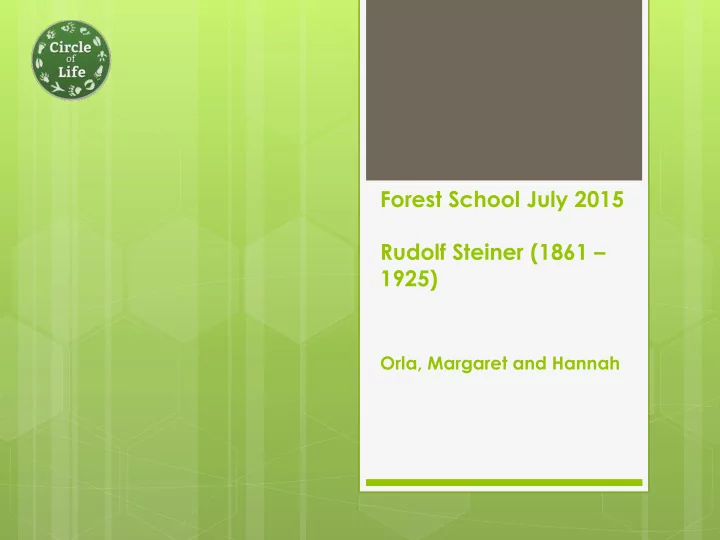

Forest School July 2015 Rudolf Steiner (1861 – 1925) Orla, Margaret and Hannah
Rudolf Steiner Was an Austrian philosopher, social reformer, architect, artist and scientist. He founded the first Steiner school in Stuttgart, Germany in 1919 after a request from the owner of the Waldorf- Astoria cigarette factory to open a school for the workers' children.
Key Features of Steiner Education Steiner schools are always The priority of the Steiner co-educational, take pupils ethos is to provide an from 3 -18 years. unhurried and creative They welcome children of learning environment all abilities from all faiths where children can find and backgrounds. the joy in learning and experience the richness In the 80 years since it was developed Steiner of childhood rather than education has become the early specialisation or largest independent academic hot-housing. educational movement worldwide.
Aim of Steiner education The aim of Steiner Waldorf education is to inspire in each student a lifelong love of learning and to enable them to fully develop their unique capacities.
Key Features of Steiner Education The linking of subject The centrality of the material and the relationship between integration of the child and teacher curriculum areas in learning
Key Features of Steiner Education The quality of the relationship that the teacher establishes with the child is of central importance in the learning process. Nurturing the child's sense of wonder and natural curiosity:
Key Features of Steiner Education Emphasis on the role The child as an active of the parents as agent in his or her learning. primary educators and the special relationship this builds with the parents and the school.
Steiner education It gives equal attention to the physical, emotional, intellectual, cultural and spiritual needs of each pupil and is designed to work in harmony with the different phases of the child’s development.
Steiner education There is a strong emphasis on independent thinking, self-confidence, resourcefulness and creativity, along with small class sizes, a very positive peer group and inspiring teachers.
Rudolf Steiner (1861 – 1925) “Our highest endeavour must be to develop free human beings who are able of themselves to impart purpose and direction to their lives. The need for imagination, a sense of truth, and a feeling of responsibility – these three forces are the very nerve of education”
Steiner Ethos in Forest Schools Steiner Ethos can be found very often in Forest Schooling. Research undertaken by the UK Forestry Commission showed the impact of Forest Schooling on children, illustrating the similarities with Steiner Education. http://www.forestry.gov.uk/pdf/SERG_Forest _School_research_summary.pdf/
Love of Learning To nurture a child’s love of learning is the main priority of Steiner education. Confidence – In forest schools children develop confidence in themselves by having the freedom, time and space to learn and demonstrate independence. Motivation and concentration – the woodland tends to fascinate children and they develop a keenness to participate and the ability to concentrate over longer periods of time.
Knowledge & understanding Forest schooling naturally encourages the children to develop an interest in the natural surroundings and respect for their environment. This is key to how Steiner wanted to develop the link between children, their spirituality and the natural world.
Physical Skills Steiner encouraged self led play in an environment that enables risk taking and opportunities to develop perseverance. The Forestry Commission research showed that the improvement in children’s physical skills were characterised by the development of physical stamina and gross and fine motor skills.
Social Skills One of Steiner’s key features to have smaller ‘classrooms’, is also a feature in Forest schools allowing children to interact more closely with their peers, teachers and parents, giving them confidence in their curiosity and teaching them empathy. This was noted in the research. Children gain increased awareness of the consequences of their actions on peers through team activities such as sharing tools and participating in play. Language development is prompted by the children’s sensory experiences .
Educating the world In Steiner’s “highest endeavour to develop free human beings who could impart purpose and direction” the research showed that: The Forest School give teachers a new understanding of the children they teach as they observe them in a different setting. Children take their experiences home and talk about them to friends and family, which sometimes lead to families visiting woodlands more frequently. These knock on affects have a major impact on “the need for imagination, a sense of truth, and a feeling of responsibility – these three forces are the very nerve of education”
Relationships Forest school provides a natural space for children and teachers using the Steiner ethos to develop a significant relationship through authentic experiences within the surroundings of the forest Facilitating learning at the child's pace, quality of interactions between adult and child due to lower ratios necessitated in the forest.
Establishing habits for a lifetime Building lifelong love of learning - through the application of Rudolf Steiner's ethos within a forest school setting we are equally developing a life long love of nature and of the environment
Imagination, Truth & Responsibility in the Forest Imagination - The natural environment – perfect canvas for imaginative play and learning, role play, and creation Truth - An absence of ‘stuff’, authentic experiences, witnessing nature, cycle of life and death, regrowth through the seasons Responsibility – Stewardship of the forest, ‘leave no trace’, managing the land
Child as capable and active learner Developing in a holistic way Construct their own knowledge through use of the senses, tactile experiences, Kinaesthetic input – whole body learning
Thank You for listening!
Recommend
More recommend